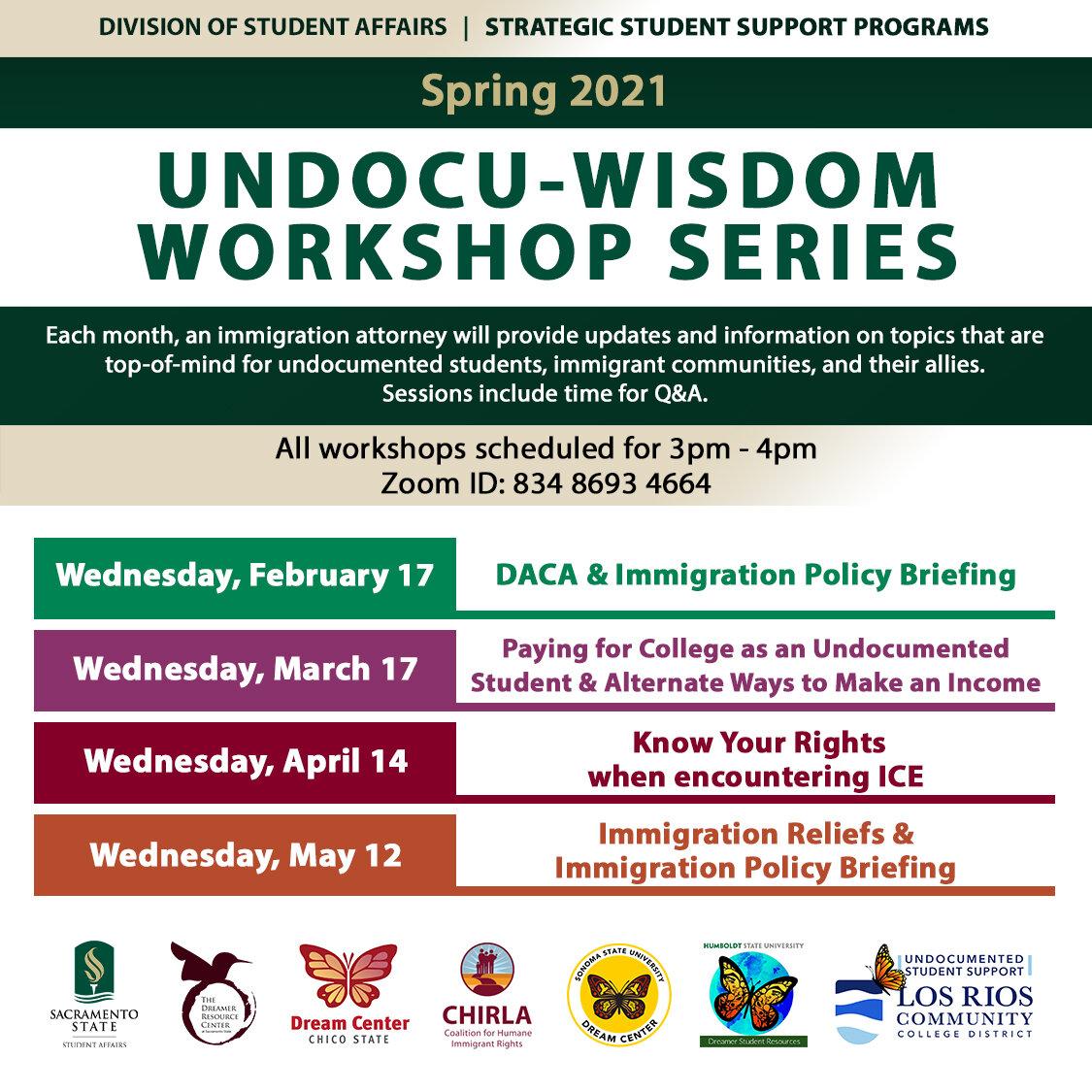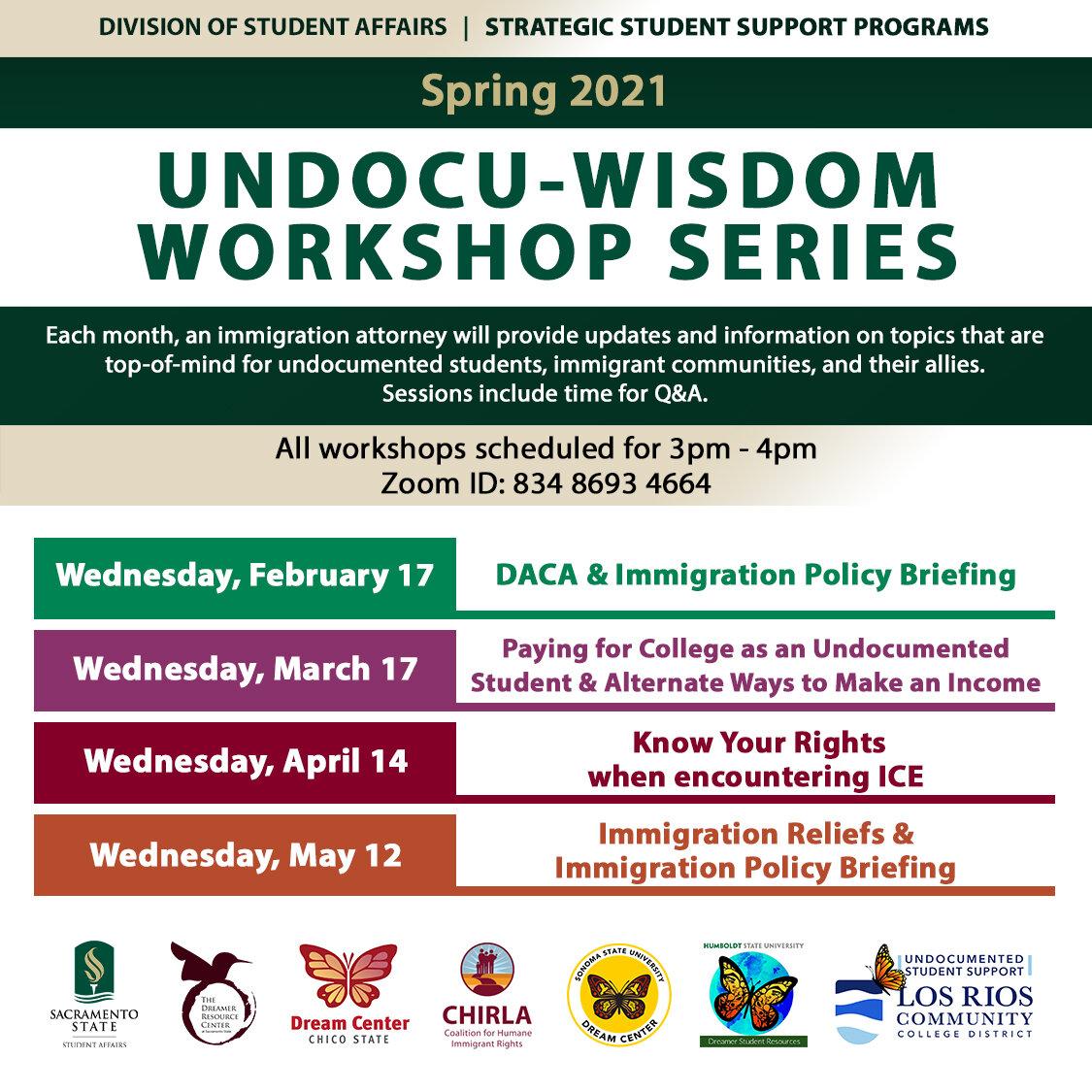Early this week, the Sonoma State Dream Center partnered with the Dreamer Resource Center at Sacramento State University to host this month’s Undocu-Wisdom workshop. This week’s workshop was titled “Paying for College as an Undocumented Student & Alternative Ways to Make an Income”.
Moderators from SSU and Sacramento State partnered with an attorney from the Coalition For Humane Immigrant Rights (CHIRLA) to present resources for undocumented students, and answer questions about paying for college. Workshop organizers chose a webinar-style format because this allows for confidentiality, which is critical for many students attending these events. It also allows for more students to attend the Undocu-Wisdom workshops. All of the Undocu-Wisdom workshops will be held in this style.
Sylvia Ortiz, the attorney from CHIRLA, started her presentation by background information on undocumented students in the United States. According to her presentation, there are approximately 10.5 million undocumented individuals in the U.S. who paid $13 billion into Social Security in 2016. On top of this, these individuals receive as much as $10 million in educational financial aid. Despite this financial aid, there are significant barriers in place which hinder undocumented students’ ability to pay for college. The two most significant barriers are the inability to work legally in the United States, and many undocumented students’ ineligibility for in-state tuition at many colleges and universities.
The 1986 Immigration Reform and Control Act allowed millions of undocumented residents in the U.S. to apply for legal status, but it also made it illegal for an employer to knowingly hire an undocumented individual. The consequences of this for undocumented individuals who seek traditional employment can be future ineligibility for certain green cards through employment or family, as well as the danger of Immigrations and Customs Enforcement (ICE) raids that target unauthorized workers.
These types of consequences create a significant barrier for undocumented young adults trying to pay for college. Ortiz talked about exceptions in this piece of legislation that can be used to benefit undocumented individuals. Students can become exempt from non-resident tuition if they meet certain coursework requirements, degree or unit requirements, or have a signed nonresident exemption request.
When it comes to employment- there are no rules in the 1986 Immigration Reform and Control Act against freelancing, starting a business, or participating in fellowship or training programs. All of these avenues can be used to generate an alternative income. Because of these loopholes, undocumented students can become self-employed or start a business as a way to generate income. The advantages of this are that self-employment can limit personal liability, and allow students to hire others, as well as seek funding and investors, and tax breaks and benefits. Becoming an independent contractor, also known as free-lancing, has its advantages as well. Free-lancers can choose their own hours, and terms of work, which can be helpful to students.
The event ended with a Q&A segment, in which students were able to ask program representatives from the Dream Centers at SSU and Sacramento State, questions about the presentation. One major aspect covered in this Q&A is that there are ways for undocumented students to hold internships and take out student loans. The California Dream Loan Program offers loans to help undocumented students offset the cost of attending college.
Currently, undocumented students can recieve state financial aid in California, but are not eligible for federal aid, such as federal student loans or Pell Grants.
Erik Ramirez, the Program Coordinator of the Dreamer Resource Center at Sacramento State University, ended the workshop by saying that, “the main takeaway from today is that even if you’re undocumented you can go to college in California, and there are ways you can make money once you graduate. Policies exist at the state and local level to make this possible, it’s just about finding them.”
Appointments at DREAM Centers for undocumented students throughout the CSU system are free, and confidential. Next month’s Undocu-Wisdom event is titled “Know Your Rights When Encountering ICE”, and it will be held on Weds., April 14 from 3-4 p.m., hosted by Chico State University.
COURTESY // Sonoma State
The DREAM Center is holding Undocu-Wisdom workshops for Seawolves to get information about topics that ring true to undocumented students.





![[Both photos courtesy of sonoma.edu]
Ming-Ting Mike Lee stepped in as the new SSU president following Sakakis resignation in July 2022](https://sonomastatestar.com/wp-content/uploads/2024/04/CC4520AB-22A7-41B2-9F6F-2A2D5F76A28C-1200x1200.jpeg)



























